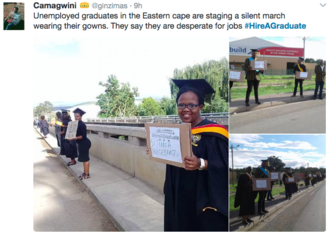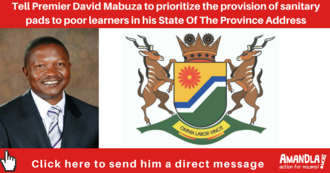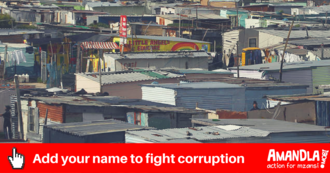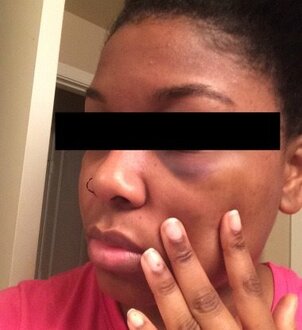- Featured
- Clean air
- Climate justice
- Consumer Rights
- Corporate Accountability
- Data access
- Early Childhood Development
- Economic fairness
- Education
- Electoral fairness
- Environmental justice
- Food justice
- Gender based violence
- Grants/social assistance
- Health
- Housing and infrastructure
- Industry interference
- Land Justice
- LGBTQIA+ rights
- Media/ information access
- Public transport
- Racism
- Reparations
- Safety
- Sanitation
- Service Delivery
- Sexual and Reproductive Rights
- Social justice
- Unemployment
- Womxn's rights/ gender equality
- Workers' rights
- More
-
Scrap the MPRDA Act of 2002 and its amendmentsThe MPRDA of 2002, even though it was later amended, still does not afford any opportunity for consultation with and consent by communities as prescribed in Free Prior and Informed Consent(FPIC). This infringes on the rights of communities to influence decisions about old and new mining in their areas. It contains limited rights on community consultations (It only addressed mitigation of environmental impacts). Communities are still not given space to negotiate the contents of the old and new rights. The MPRDA of 2002 also separates the surface rights from the mineral rights, and converted old order rights of mining companies to mine on communal land to new ones without consulting communities to listen to their views. The Act states that the conversion is automatically granted for as long as the company can show that it has a Black Economic Empowerment (BEE) partner and that the Municipality has agreed to a social labour plan providing for housing and local economic development plans. Once this has been checked, new mining can happen without any consent by the community. All that is required under section 5(a) is a 21 days written notice before mining commences. This cannot be right.1 of 100 SignaturesCreated by Land Access Movement of South Africa
-
Protect Customary Land RightsThe Constitution recognises the informal or customary rights of people living in the former homelands yet the Department of Rural Development and Land Reform has failed to legislate a communal land rights law that will strengthen and protect these rights. As a result; * Big cooperates are grabbing land in the communal land without any compensation for loss citing development. * Nature of individuals and family rights within a broader community are not clarified, and overshadowed by majority in the community. * People are not adequately compensated when land is sold or awarded for big developments * Consultation and Consent of land occupiers is not respected because of the weak nature of the rights provided by current law. In 1996, Parliament passed the Interim Protection of Informal Land Rights Act (IPILRA) to provide protection for all people living on communal land in the former Bantustans, people living on trust land, people who previously had Permissions to Occupy (PTOs) and anyone living on land uninterrupted since 1997 “as if they were the owner”. This was a big milestone in the protection and recognition of customary land rights and the empowerment of families to be part of bargaining and negotiations of any socio-economic development happening in their land. Although people are protected by IPILRA, the fact that it is temporary and can be renewed annually, deprives people of their rights to say NO to development that disadvantages them. This makes it easy for "developers" or Government to easily expropriate the land. It is also worth noting that the law also states that the Minister of Rural Development and Land Reform can make regulations in terms of IPILRA to provide more detailed processes and procedures.83 of 100 SignaturesCreated by Alliance for Rural Democracy
-
Tobeka Daki Campaign for Access to TrastuzumbSwiss multinational company Roche is facing global condemnation from women living with cancer, families of people with cancer, activists, scientists, researchers and health professionals from across the world who demand that no woman go without it lifesaving breast cancer treatment because it is too expensive. On 7th February, the Fix the Patents Laws Campaign launched the Tobeka Daki Campaign for Access to Trastuzumab in loving memory of a fearless activist who lead the struggle to ensure access to breast cancer treatment for women in South Africa. Despite being prescribed trastuzumab, a WHO essential medicine for the treatment of HER2+ breast cancer, Tobeka was never able to access the treatment due to its high cost. In South Africa the annual price in the private sector is around ZAR 516,700. The few public facilities which can access trastuzumab do so at a lower price of around ZAR 211,920 per year. Both out of reach of most. But, health economists have shown that a year’s worth of trastuzumab can be produced and sold for around ZAR 3 400. Drastically less. This estimated price even includes a 50% increase above the cost of production for profit. Meanwhile Roche are posting fat profits. In 2015 Roche made US$ 8.9-billion profit (around 119 billion Rand). In the same year CEO Severin Schwan earned US$ 12-million (around 160 million Rand). It seems highly plausible that Roche could cut the price of trastuzumab dramatically and still be very profitable. Instead Roche maintains it’s high prices in any way possible. Roche holds multiple evergreened patents on trastuzumab in certain countries across the world. In South Africa, for example, multiple patents extend their monopoly until 2033. In countries where the patents have ended or do not exist, Roche is using other means to block potentially more affordable biosimilar versions coming to market. In India Roche have initiated a court challenge against the Indian regulatory body for its decision to approve Mylan’s version as a biosimilar product. In Brazil and Argentina, Roche is one of the pharmaceutical companies litigating against those governments for their attempts to use legal international safeguards to protect public health. For too long Roche has been allowed to charge exorbitant prices for these lifesaving treatments. Tobeka had one life. Her two children had one mother. We had the means to give her a chance at survival and we failed her – as we will continue to fail other women. Shame on Severin Schwan (Roche CEO) for insisting on fat profits while you could save lives by trimming your profits. Roche could have given Tobeka a chance, but instead they turned their back on her. Demand that Roche do not turn their back on all the other women across the world. #RocheGreedKills #ForTobeka www.fixthepatentlaws.org160 of 200 SignaturesCreated by Amandla.mobi Member
-
Dismiss Tshathugodo for Rape Culture CommentsWe make this call following Tshatha's appalling comments which were rape justifying, violent and wholly unacceptable in a society that claims to care about the equality, dignity and freedom of womxn. Written on his Facebook page on the 21st February 2017, and posted with a photo of two young womxn wearing what he identifies as clothes revealing their thighs. Find below a loose translation of his comment; "In the end people will say men are dogs despite that they are provoked by these legs (very loose translation). What women need to know is that when they're dressed like this men salivate and think of the bed (meaning sex). If you think that a man will think of marriage you'll never see that happening. These women are beautiful but the way they're dressed takes away their dignity." Tshatha's comments, which are reproduced verbatim above, briefly suggest that: (a) we should not crucify men who sexualise and violate womxn who wear clothes that show their thighs; (b) the sexualisation and violation of such womxn is justified because womxn should dress in a 'respectful manner' as no man would think about marrying them. Tshatha's comments must be understood in the context of the broader problem of rape culture in South Afrika. One in three womxn get raped every day in the country, and womxn are victims of daily sexual violence from men. Behind this scourge is culture of rape which manifests itself in (a) the entitlement that men like Tshatha have to women's bodies, and to dictating what womxn should and should not wear, (b) the blaming and shaming of rape victims based on the type of clothing they were wearing; and (c) the suggestion that rape is not caused by men's violence and lack of self-control but by womxn themselves because of how they dress. It is wholly unacceptable for public figures like Tshatha, fully aware of the scourge of rape in South Afrika and with access to millions of people, to make comments which justify and perpetuate this line of thinking. We note that the SABC has not released any statement to address this issue publicly. And that individual responses to emails suggest that the issue has not been taken seriously in response to the public outcry. The meek apology that Tshatha has published on his Facebook page since does not deal with the issue. ● None of them actually address the sexism in Tshatha's comments, and their indubitable effect in perpetuating rape culture. ● The response to an emailed complaint about this matter (which we have in our possession from the SABC) suggests that the comments were okay because they were Tshatha's 'personal opinions', and indicates that they would not have been a problem had these statements not 'implicated the mother brand'. We find it insensitive and distasteful that the SABC is more concerned about its brand than the dignity of womxn. ● Both the email response and Tshatha's meek apology suggest that the problem was not the substance of Tshatha's rape justifying comments but the wording he chose to make them. ● Tshatha's meek apology shows no honest regret over his statements but is merely concerned with apologising to those who were offended by his comments. It is clear that he otherwise still stands by his comments, and this is evidenced by the fact that he has not bothered to remove them. ● It is not clear what disciplinary measures the SABC has taken - particularly considering that Tshatha is a serial offender who has made numerous similar statements in the past. A quick perusal of his social media pages reveals a plethora of sexist, homophobic, transphobic and other discriminatory statements which make us wonder how Tshatha is still under the SABC's employ unless it associates with and approves it his bigotry. We draw the SABC's attention to its position as a public broadcaster, and to the fact that it is bound by the democratic values of equality and dignity expressed both in the Constitution, and the Broadcasting Act under which the SABC was established. We find the views of Tshatha, whose salary is paid by the same public which he has disrespected, inimical to these values, and in diametric opposition to the spirit, objects and purpose of of the SABC's mission. While we respect Tshatha's right to freedom of expression, we submit that this right is limited by the rights of others and does not extend to violence against womxn. We therefore call upon the SABC to immediately dismiss Tshatha from its employ, and to send a message that violence against womxn is not going to be tolerated. We further call upon all people to sign and widely distribute this petition, and to reaffirm our collective commitment to the dignity and freedom of womxn. Izwe Lethu! ✋1,678 of 2,000 Signatures
-
Hire a graduate, even if they don't have experienceWe can't get jobs because we lack experience, we are suffering.1,201 of 2,000 SignaturesCreated by Phumelele Hlongwane
-
Prioritize sustainable provision of sanitary pads in quintile 1-3 schools in MpumalangaOn average in Mzansi. a girl will miss 60 days of school because of her period [1]. And some are forced to use socks, newspapers and worse because they can’t afford sanitary pads. Over time this can cause girls to drop-out completely. If they struggle through, they often find themselves unable to fully take part in school activities. Last year, we watched as Parliament introduced Max, the flavoured condoms. While efforts aimed at reducing the rate of HIV/AIDS are commendable, we cannot ignore the plight of the girl child who loses her dignity and time for her studies for something she cannot opt out on. “You have to enable that child to go to school every day because the concern is that women are illiterate. If (not having access to) sanitary towels make girls not go to school, it should be your primary concern” ANC MP Patricia Chueu. [1] Dignity Dreams article with information on how many girls miss school a month and in a year: http://www.ngopulse.org/organisation/dignity-dreams5 of 100 SignaturesCreated by Amandla.mobi Member
-
Prioritize sustainable provision of sanitary pads in quintile 1-3 schools in the Northern CapeOn average in Mzansi. a girl will miss 60 days of school because of her period [1]. And some are forced to use socks, newspapers and worse because they can’t afford sanitary pads. Over time this can cause girls to drop-out completely. If they struggle through, they often find themselves unable to fully take part in school activities. Last year, we watched as Parliament introduced Max, the flavoured condoms. While efforts aimed at reducing the rate of HIV/AIDS are commendable, we cannot ignore the plight of the girl child who loses her dignity and time for her studies for something she cannot opt out on. “You have to enable that child to go to school every day because the concern is that women are illiterate. If (not having access to) sanitary towels make girls not go to school, it should be your primary concern” ANC MP Patricia Chueu. [1] Dignity Dreams article with information on how many girls miss school a month and in a year: http://www.ngopulse.org/organisation/dignity-dreams2 of 100 SignaturesCreated by Amandla.mobi Member
-
Prioritize sustainable provision of sanitary pads in quintile 1-3 schools in LimpopoOn average in Mzansi. a girl will miss 60 days of school because of her period [1]. And some are forced to use socks, newspapers and worse because they can’t afford sanitary pads. Over time this can cause girls to drop-out completely. If they struggle through, they often find themselves unable to fully take part in school activities. Last year, we watched as Parliament introduced Max, the flavoured condoms. While efforts aimed at reducing the rate of HIV/AIDS are commendable, we cannot ignore the plight of the girl child who loses her dignity and time for her studies for something she cannot opt out on. “You have to enable that child to go to school every day because the concern is that women are illiterate. If (not having access to) sanitary towels make girls not go to school, it should be your primary concern” ANC MP Patricia Chueu. [1] Dignity Dreams article with information on how many girls miss school a month and in a year: http://www.ngopulse.org/organisation/dignity-dreams17 of 100 SignaturesCreated by Amandla.mobi Member
-
Prioritize sustainable provision of sanitary pads in quintile 1-3 schools in the North WestOn average in Mzansi. a girl will miss 60 days of school because of her period [1]. And some are forced to use socks, newspapers and worse because they can’t afford sanitary pads. Over time this can cause girls to drop-out completely. If they struggle through, they often find themselves unable to fully take part in school activities. Last year, we watched as Parliament introduced Max, the flavoured condoms. While efforts aimed at reducing the rate of HIV/AIDS are commendable, we cannot ignore the plight of the girl child who loses her dignity and time for her studies for something she cannot opt out on. “You have to enable that child to go to school every day because the concern is that women are illiterate. If (not having access to) sanitary towels make girls not go to school, it should be your primary concern” ANC MP Patricia Chueu. [1] Dignity Dreams article with information on how many girls miss school a month and in a year: http://www.ngopulse.org/organisation/dignity-dreams5 of 100 SignaturesCreated by Amandla.mobi Member
-
#JUSTICEFORVUYI - SAY NO TO BAIL for Femicide AccusedOn 2 January 2017, a strong, beautiful and tenacious young woman, with a heart made only of gold, was taken from us. A bright light in the lives of all who knew her, this loving mother of three children, was brutally assaulted and killed by her husband in Westlake, Cape Town. This mother of three was allegedly stabbed in full view of the community by her husband and residents claim he had been abusive towards her. South Africa has a femicide rate five times higher than the global average. “Research proves that the chances of a woman being murdered by someone that she knows or is in an intimate relationship with are much higher than any other type of murder… Motives are often financial, adultery or a love-triangle, custody or a residential battle for children.” – Anni Hesselink. In the words of community leader Vusumzi Nelani “This is a very sad case. This is what happens to many women and if the court is lenient this abuse will continue so we want the court to take this case very serious.” (News24, 26/07/2017) Please take a few minutes to sign today if you can. There are witnesses and three vulnerable young children we need to protect!! If we want our voices against domestic violence to count, we need them to count in court too!! Please share this link for friends, family and colleagues to sign. Thank you very much.693 of 800 SignaturesCreated by Nicole Elliott
-
Fight corruption, demand transparent service delivery in [put the name of your municipality here]We can improve service delivery and fight corruption in our Municipality by ensuring all Service Delivery Agreements (SDAs) are public and easily accessible to all. Some politicians, officials and businesses are scared about transparency, but if they aren't doing anything wrong, what have they got to hide. * This campaign by amandla.mobi is supported by Heinrich Böll Stiftung.10 of 100 SignaturesCreated by Vusi Sodiye
-
You are Not AloneEveryone tends to overlook the amount of pain someone goes through while dealing with an emotionally and verbally abusive relationship. It starts off so innocent, little remarks, about the things that you wear, or the guys you talk to, or even where you sit. You just chalk it up to your significant other being jealous, or whatever the case may be. But eventually things start to develop into patterns. You're making more and more excuses for this person, you go to your friends bawling your eyes out, and they tell you that you're right while your significant other is screaming at you that you're so wrong.4 of 100 SignaturesCreated by Ronaldo Putlane

.png)



.png)







